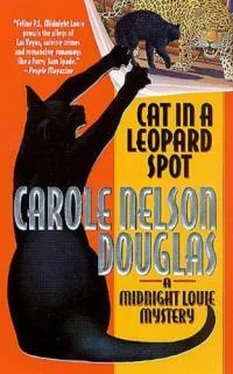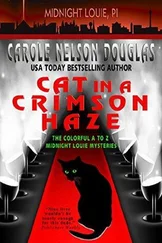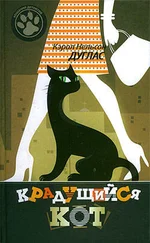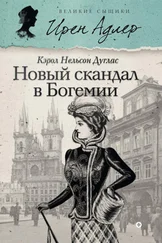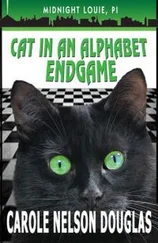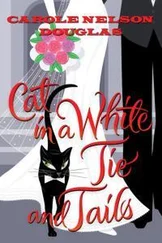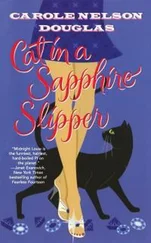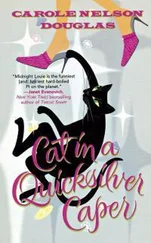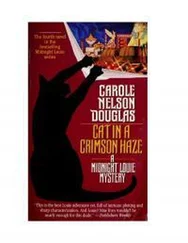Matt still had innocence to lose, long beyond the age most people are permitted to be innocent.
If Kitty O’Connor coerced that hope and dream from him, she had done something worse to him than Cliff Effinger had managed in years of daily domestic tyranny. He couldn’t let her do it and still be whole.
And, of course, she knew that.
Max Kinsella could never understand that. Except possibly Matt’s hopeless devotion to Temple. That he would understand only too well, and too personally.
Where could Matt go, who could help him, who would understand what he was up against?
Which was a devil in human guise.
He looked at the serpentine ring.
Beware of beautiful women bearing gifts.
And old grudges.
And golden chains.
Chapter 29
Damage Control
As soon as Max left Devine’s apartment he ducked into another unit’s cul-de-sac hallway and pulled a small folding cell phone from his jacket pocket.
The unit was small enough to be overlooked in a cursory search, and certainly small enough to cause no unseemly lumps in his Italian tailoring.
Before he did anything else, though, he slumped against the wall and closed his eyes. He felt as drained as if he had just done his second two-hour show of the night at the Goliath.
“Master of Mystery” had been one of his billing sobriquets, but the Mystifying Max had never believed his own hype. The mysteries of life mastered us, we the people, the eternal actors and audience at one and the same time.
Right now he felt the exhaustion of a spy who had been in the camp of the enemy for too long.
The word “enemy” made his lips spasm in the impulse of a smile. Matt Devine would be astounded that anyone might regard him that way, but it wasn’t personal, at least not between Max and Devine.
It was just that Max knew quite well that whatever had happened between Temple and Devine during Max’s enforced absence—or whatever had almost happened—had not been trivial. Even a master of illusion couldn’t compete with substance.
And not that his and Temple’s relationship didn’t have substance, but circumstances kept forcing it to indulge the surfaces rather than get lost in the depths below.
So Max, who had lived and worked all over Europe in his twenties and knew the attractions and evils (and that sometimes they were the same) of many worlds, found himself momentarily Koed by his recent tour of one ex-priest’s apartment. Mentally knocked off his own self-certain foundation.
Maybe it was just the intimate glimpse into someone he had to regard as a rival.
As residences went, the place was pathetic: more unfurnished than not, with an air of undergraduate impermanence. Except for the slashing grin of the red suede couch in the living room—it reminded Max of some surreal Marilyn-mouth of a loveseat designed by some artist or other whose name he couldn’t remember—everything was strictly brick-and-board and borrowed looking.
The bedroom especially, with its tiny TV on a cheesy cart, the kind of setup you’d find in a low-rent nursing home, with the childish island of a single bed, a fact Max found sad and a woman like Temple would probably find in need of fixing, with that shelf of paperback heavy reading, philosophy and sociology in broken-spine and dog-eared array…and then between Thomas Merton and Thomas Mann, the oddity of a single bestseller here and there. He found the presence of The Joy of Sex sinister. And only one popular fiction work …Surrender by Sulah Savage…Now, what was that about?
Max suddenly recalled that Temple’s engaging aunt in Manhattan, the one who owned that terrific Village condo, wrote historical romances. Maybe Surrender was one of hers. Temple had given it to Devine for some reason, and he had felt obligated to set it out. It hadn’t been read, certainly.
Manhattan. A flood of familiar emotions replaced the uneasy feelings Max was indulging now. Finally, finally, he had overcome the deep breach he had driven between himself and Temple by vanishing without word for almost a year. Even though she understood better than anybody his urge to protect her from the deadly forces on his trail, the wound of abandonment within was raw and oozing.
It was only on the alien ground of Manhattan and during the magic of the Christmas holiday, the little-kid-wanting-the-impossible time, that Max had been able to break through her hurt to the trust of a physical relationship again. It had taken every bit of the considerable charisma he possessed, and the accommodating aunt. He never made the mistake of taking Temple for granted, nor of assuming their current situation would satisfy her forever.
And, then, to spend time touring the premises of the next most likely candidate…and to end up feeling a pang of sympathy at the impermanent, solitary, on-the-run lifestyle Max himself knew far too well, half postadolescent rootlessness, half monkish withdrawal.
And those sudden, obviously new acquisitions blooming like high-tech bouquets amid the arid landscape: gadgets in the kitchen, the video and audio equipment in the living room, the answering machine in the second and even emptier bedroom, all of them with curled-cover instruction booklets sitting next to them…it was laughable, poignant.
For Matt Devine, Max wondered, was Temple a mysterious new gadget in his brave new world, and did he wish that she came with an instruction booklet?
Max laughed quietly to himself, then sobered as he considered the reason he had been called in as a debugging expert. He supposed Devine had hated his intrusion as much as Max had. Max remembered the man’s startled expression on seeing him outside the door, even though Devine was expecting him.
The feeling was mutual, bub.
Most men were too homophobic to much notice the looks of other men, but every time Max saw Devine he was stunned by the matinee-idol handsomeness. It wasn’t just a photogenic face. Real matinee idols knocked other people out: gender or age had nothing to do with it, just some genetic combination of features that stunned everyone.
Max suspected this unasked-for gift was more a barrier than anything. In Devine it was combined with an unconsciousness—no, a disregard—that made the good looks all the more compelling.
Max had met only one other person in his life with that kind of visual impact: Kathleen O’Connor. He laughed again, seeing Sean and himself acting like clumsy clowns, tangling their tongues, their overgrown feet, trying to compete for a colleen like Kathleen.
She was as dewy as the fabled island that spawned her, moist and fecund and lush and intriguingly cloudy, elusive. She made even boys understand why the Cavalier poets had written reams to their mistresses’ ivory white skin, rose-petal lips, and “brunette beauty.”
Max had long since learned to get past beauty, but he wondered what would happen to that if he saw Kathleen, or Kitty as she called herself to Devine, again after all these years. From the sketch Devine had commissioned of her, age had not withered a scintilla of it.
And, yes, he took the threat she posed seriously, though he hadn’t let on to Devine. Max was used to keeping his own counsel, to directing the show of his life and his life’s work. Only part of it, the least important, had been onstage.
So. He leaned against the wall, partly indulging his ego with a paranoid sense of personal competition, partly putting off confronting the ugly certainty that lives he cared about were in danger, and only he could do something to stop it.
In the years between Sean’s death in Northern Ireland, he had atoned for surviving the IRA bombing, for the sin of not being there, by saving strangers’ lives. Now it had come full circle. The lives he needed to save were those as close to him as he allowed these days, Temple principally, of course, but he had to save Temple the loss of those she cared for to save her completely, and that was a wider circle.
Читать дальше
